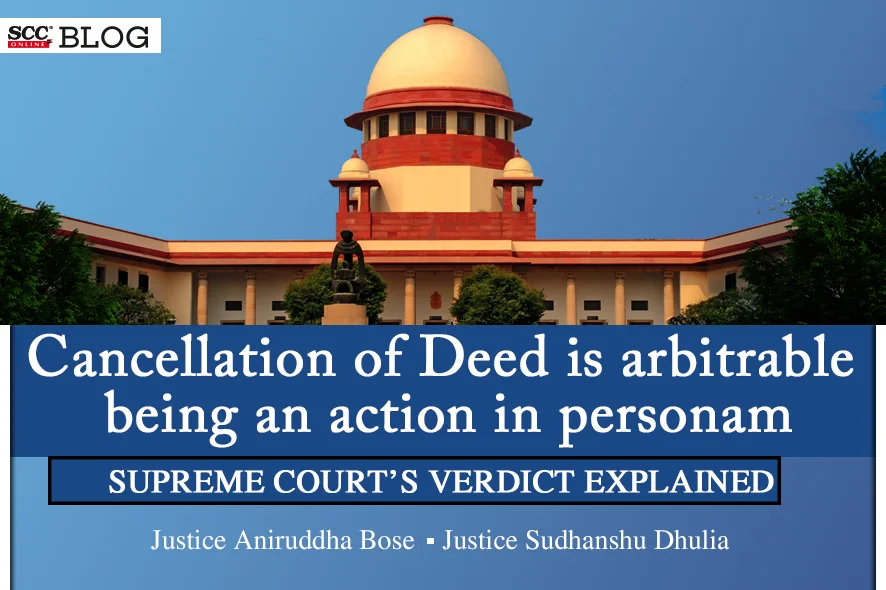Supreme Court: In an appeal against Trial Court and Bombay High Court’s decision, whereby, the respondent’s application under Section 8 of the Arbitration and Conciliation Act, 1996 (“Arbitration Act”) for referring the matter to arbitration was allowed. A declaration was sought as to declare the Conveyance Deed as null and void, was referred to arbitration by the Bombay High Court, rejecting the appellants’ petition. The Division Bench comprising of Aniruddha Bose and Sudhanshu Dhulia, JJ. dismissed the appeal and held that the cancellation of deed is an action in personam, hence it is arbitrable.
Factual Matrix
Emerald Acres Private Limited (respondent 2/ EAPL) was incorporated by appellant and her husband on 18-04-2006 to carry on the business of real-estate development. Subsequently, two Tripartite Agreements were signed between appellant’s husband, respondent and EAPL in 2007 and 2008 to develop, trade, and deal with the property and also to acquire such further properties as may be mutually agreed between the parties. Both the Tripartite Agreements contained the arbitration clause. The appellant’s husband died and bequeathed his assets to the appellants (his wife and son) through a will dated 10-02-2011. The appellants filed a suit seeking a declaration that the Deed of Conveyance dated 17-12-2019 and the Development Agreements be declared null and void, entered into pursuant to the two Tripartite Agreements be declared validly terminated.
Issue
Whether the Trial Court and the High Court rightly referred the matter to arbitration or is the dispute of such a nature that it cannot be referred to arbitration?
The Court said that the first prerequisite for an application under Section 8 was satisfied in the 2007 and 2008 Tripartite agreements. Therefore, the Court held that the Trial Court and the High Court had rightly held that the broad language of the “arbitration clause” in the two Tripartite Agreements dated would cover the dispute raised by the appellants before the Civil Court, and hence the case was rightly referred for arbitration.
Regarding judicial interference in arbitration matters, the Court stated that the role of a ‘Court’ is extremely limited in arbitration matters. The Court perused Section 5 and 8 of the Arbitration Act and noted that major amendments were made in the Arbitration Act in the year 2015, inter alia, both in Section 8 and Section 11 and the basic purpose for the amendments were to minimise the scope of judicial authority in matters of arbitration, except on the ground where prima facie, no valid arbitration agreement exists.
The Court noted that the two Tripartite Agreements, forms the basis for all subsequent agreements, conveyance, etc. The Court said that the arbitration clause in these agreements between the appellant’s husband, respondent and EAPL is very wide in its scope, as it states that “any dispute, in relation to these agreements or in relation to any matter touching or arising from this Agreement, shall be referred to arbitration.” Hence, the Court rejected the appellant’s contention as to non- arbitrability of the said matter.
Arbitrability of Cancellation of Deed
The Court noted that in Booz Allen and Hamilton Inc. v. SBI Home Finance Limited and Others, (2011) 5 SCC 532, cases were set apart where the dispute was totally non-arbitrable, such as matrimonial disputes, guardianship dispute, or disputes relating to consumers.
Further, the Court noted that in Vidya Drolia v. Durga Trading Corpn., (2021) 2 SCC 1, a fourfold test for determining when the subject-matter of a dispute in an arbitration agreement is not arbitrable. However, the Court said that the present case did not fall in any of the categories.
The Court referred to Vidya Drolia (supra), wherein, it was held that Court will only decline reference under Section 8 or under Section 11 of the Arbitration Act in rare cases where the Court is certain that either the arbitration agreement is non-existent, or the dispute is itself “manifestly non-arbitrable”.
On perusal of Section 16 of the Arbitration Act, the Court said that all jurisdictional issues including the existence and the validity of an arbitration clause can be taken up by the Arbitral Tribunal. Therefore, the Court reiterated that the Arbitral Tribunal is competent to decide on its own competence.
Placing its reliance on Booz Allen (supra), the Court said that after the 2015 amendment, the Court only has to see whether a valid arbitration agreement exists between the parties. Regarding the objection raised by the appellant on application of Section 8 of the Arbitration Act, that ‘the cancellation of a document relating to immovable property i.e. land was sought and therefore it amounts to an action in rem and hence, the matter was non-arbitrable.’ The Court said that the question is no longer res integra, as in Deccan Paper Mills v. Regency Mahavir Properties, (2021) 4 SCC 786, it was held that whether it is a suit for cancellation of a deed or a declaration of rights rising from the deed, it would only be an action in personam and not in rem and it was also held that a relief sought under the Specific Relief Act, 1967 is nothing but an action in personam.
Therefore, the Court held that both the Tripartite Agreements contained an arbitration clause, which formed the basis of all subsequent agreements including the agreements sought to be declared as validly terminated by the appellants and the conveyance deed sought to be declared as null and void. Hence, the Court upheld the Trial Court’s and the High Court’s decision to refer the matter to arbitration.
[Sushma Shivkumar Daga v. Madhurkumar Ramkrishnaji Bajaj, 2023 SCC OnLine SC 1683 Decided on 15-12-2023]
Advocates who appeared in this case :
For Appellants: Advocate Devansh Mohta, Advocate-On-Record Shirish K. Deshpande, Advocate Rucha Pravin Mundlik, Advocate Harsimran Kaur Rai, Advocate Gaurangi Patil, Advocate Mohit Gautam, Advocate Apoorv Sharma
For Respondents: Advocate-On-Record E.C. Agrawala, Advocate-On-Record Tishampati Sen, Advocate Riddhi Sancheti, Advocate Anurag Anand, Advocate Himanshu Kaushal, Advocate Mukul Kulhari






